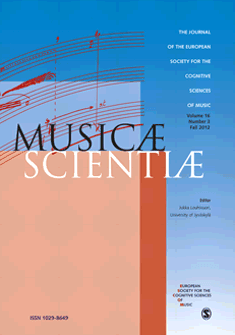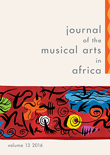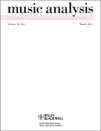
FONTES ARTIS MUSICAE
Scope & Guideline
Connecting scholars and practitioners in the realm of music.
Introduction
Aims and Scopes
- Historical Musicology:
The journal frequently publishes research that examines historical contexts and developments in music, including analyses of composers, music collections, and performance practices across different eras. - Cultural Studies in Music:
There is a consistent focus on the cultural implications of music, including studies of music in social contexts, the impact of colonialism on musical practices, and the role of music in identity formation. - Pedagogical Approaches to Music Education:
The journal emphasizes innovative teaching methodologies and the evolving landscape of music education, particularly in response to contemporary challenges such as the COVID-19 pandemic. - Archival Research and Preservation:
Research often highlights the importance of music archiving, cataloging, and preservation practices, showcasing efforts to document and sustain musical heritage, particularly in relation to indigenous and folk music. - Interdisciplinary Methodologies:
The journal employs a variety of methodologies, including data analysis, ethnomusicology, and sociomaterial perspectives, to deepen the understanding of musical phenomena in historical and contemporary contexts.
Trending and Emerging
- Digital Archiving and Cataloguing:
There is a marked increase in research related to the digital archiving of music, including the cataloguing of traditional and historical music collections, highlighting the importance of technology in preserving musical heritage. - Impact of Global Events on Music:
Recent publications have begun to address the impact of global events, such as the COVID-19 pandemic, on music education and practice, showcasing a timely response to contemporary challenges faced by musicians and educators. - Intersections of Music and Politics:
Emerging themes increasingly explore the relationship between music and political contexts, including studies on how music functions within cultural politics and historical movements, reflecting a growing interest in the sociopolitical implications of musical expressions. - Focus on Underrepresented Composers and Genres:
There is a trend towards spotlighting lesser-known composers and musical genres, particularly those from marginalized communities, which enriches the discourse in music history and challenges traditional narratives.
Declining or Waning
- Traditional Music Studies:
There has been a noticeable decrease in publications focusing solely on traditional music forms without the integration of contemporary methods or digital archiving practices. This shift suggests a move towards more interdisciplinary approaches rather than purely ethnomusicological studies. - Music Theory and Analysis:
Research centered on traditional music theory and analysis has seen a decline, possibly indicating a shift towards more applied and contextual studies that emphasize the cultural and social dimensions of music rather than theoretical frameworks. - Nineteenth-century Music Focus:
While still relevant, studies specifically dedicated to the music of the nineteenth century appear less frequently, as the journal seems to be pivoting towards exploring broader historical contexts and contemporary issues.
Similar Journals

Studia Universitatis Babes-Bolyai Musica
Championing Open Access in Music ScholarshipStudia Universitatis Babes-Bolyai Musica is a prestigious academic journal dedicated to the field of musicology, published by UNIV BABES-BOLYAI. Since its inception, it has strived to foster scholarly communication and share groundbreaking research that spans various music-related disciplines, including ethnomusicology, music theory, and performance studies. The journal operates under an Open Access model since 2021, ensuring that its content is freely accessible to a global audience of researchers, professionals, and students interested in advancing their knowledge and understanding of music. By providing a platform for high-quality, peer-reviewed articles, Studia Universitatis Babes-Bolyai Musica plays a vital role in promoting significant contributions to the evolving discourse in music studies. Its commitment to intellectual rigor and openness aligns with contemporary academic trends, making it an essential resource in the realm of music research.

MUSICAE SCIENTIAE
Advancing Understanding of Music's Cognitive ImpactMUSICAE SCIENTIAE, published by SAGE Publications Ltd, is a prestigious interdisciplinary journal situated at the intersection of music and psychological studies. Established in 1997, this journal has garnered an impressive reputation, as evidenced by its 2023 Scopus rankings, where it ranks #2 in Music (Arts and Humanities) and #51 in Experimental and Cognitive Psychology. With a considerable impact factor and categorized in the Q1 and Q2 quartiles, it stands as a key resource for researchers, students, and professionals interested in the cognitive processes related to music engagement and its applications. Although it does not operate under an open access model, MUSICAE SCIENTIAE provides valuable insights and empirical studies that contribute to the ever-evolving understanding of music's impact on human behavior and cognition. By fostering a robust platform for scholarly dialogue, this journal continues to significantly influence research and practice within its fields.

MUSIK IN BAYERN
Unveiling the Soundscape of BavariaMUSIK IN BAYERN is a distinguished journal devoted to the study of music within the rich cultural context of Bavaria, published by HANS SCHNEIDER. With the ISSN 0937-583X, this publication serves as an essential resource for researchers, professionals, and students interested in the historical and contemporary musical landscape of the region. Spanning topics from traditional Bavarian folk music to modern interpretations, the journal aims to foster a deeper understanding and appreciation of Bavarian music in a global context. Although the journal's coverage in Scopus has been discontinued, it remains an essential platform for scholarly communication and analysis in music studies. While MUSIK IN BAYERN operates under a subscription model, it continues to hold significance as an intellectual resource for advancing research in musicology.

Musicologica Brunensia
Empowering Scholars in the World of MusicologyMusicologica Brunensia, an esteemed journal published by Masaryk University, Faculty of Arts, serves as a significant platform for the dissemination of knowledge in the field of musicology. Based in the Czech Republic, this Open Access journal has been facilitating scholarly communication since 2009, allowing unrestricted access to its rich array of research articles. With an ISSN of 1212-0391 and an E-ISSN of 2336-436X, Musicologica Brunensia proudly holds a Q3 ranking in the Music category as of 2023, reflecting its dedication to advancing research in the arts and humanities, particularly music. The journal accepts contributions spanning diverse topics within music studies, fostering interdisciplinary dialogue among researchers, professionals, and students alike. Located at Arne Novaka 1, Brno, 60200, Czech Republic, Musicologica Brunensia is poised to continue its journey of promoting innovative scholarship in musicology until 2024 and beyond, making it a valuable resource for anyone passionate about the field.

Revista de Musicologia
Illuminating the World of Music Through Rigorous AnalysisRevista de Musicologia is a distinguished academic journal dedicated to the exploration and analysis of musicology, published by the SOC ESPANOLA MUSICOLOGIA. Based in Spain, this journal serves as a vital platform for music scholars, researchers, and enthusiasts to share innovative insights and original research concerning various aspects of music, including historical studies, ethnomusicology, and contemporary critiques. With its ISSN 0210-1459 and a current Scopus ranking placing it in the Q3 quartile of Music studies, the journal reflects a commitment to enhancing the discourse in this rich field. Although it currently does not publish under an open-access model, it continuously aims to provide a rigorous peer-reviewed environment for contributions that engage both academic inquiry and practical applications within musicology. The Revista de Musicologia is thus an essential resource for anyone in the field looking to expand their understanding and expertise in music studies from 2016 through 2024 and beyond.

RIVISTA ITALIANA DI MUSICOLOGIA
Connecting Scholars Through the Language of MusicRIVISTA ITALIANA DI MUSICOLOGIA, published by the Italian Society of Musicology, is a distinguished journal dedicated to the field of musicology, offering a platform for scholarly research and discourse on a wide array of musical topics. With an ISSN of 0035-6867 and an E-ISSN of 2036-5586, this journal has contributed significantly to the understanding of music in cultural and historical contexts. Although the scope of coverage was marked from 2003 to 2008 in renowned databases like Scopus, the journal continues to serve as an invaluable resource for researchers, educators, and students embroiled in music studies. Its emphasis on rigorous research and critical analysis makes it a vital asset for anyone seeking to deepen their knowledge of musicological inquiry. While not an open-access publication, the RIVISTA ITALIANA DI MUSICOLOGIA remains a prestigious outlet for scholarly contributions that reach audiences eager to explore the complexities of musical heritage.

Journal of the Musical Arts in Africa
Advancing Scholarship in African Musical TraditionsThe Journal of the Musical Arts in Africa is a premier academic publication dedicated to exploring the rich and diverse musical traditions of the African continent. Published by ROUTLEDGE JOURNALS, TAYLOR & FRANCIS LTD, this journal offers a vital platform for researchers, professionals, and students in the field of musicology. With an ISSN of 1812-1004 and E-ISSN of 2070-626X, the journal has established itself as a significant contributor to the scholarly discourse surrounding African musical practices. With an impact factor reflecting its growing influence, the Journal of the Musical Arts in Africa is categorized in the Q3 quartile of music journals according to the latest metrics, placing it among an essential cadre of publications in the field. The journal invites original research articles, reviews, and critical essays that aim to expand the understanding of music as an integral part of African culture. It has been continuously publishing since 2004 and encompasses a wide range of topics, making it a must-read for anyone interested in the intersections of music, culture, and identity on the African continent. The journal stands as a testament to the vibrant musical heritage of Africa and encourages scholarly contributions that highlight the importance of music in reflecting and shaping societal values.

MUSIC ANALYSIS
Unlocking the Secrets of Musical InfluenceMUSIC ANALYSIS, published by WILEY, is a prestigious journal in the field of musicology, recognized for its critical contributions to the analysis of music and its myriad influences on culture and society. With an ISSN of 0262-5245 and an E-ISSN of 1468-2249, this journal has established itself as a vital resource for researchers, professionals, and students alike, boasting a Q1 ranking in the 2023 category of Music. As part of a highly competitive field, it ranks 70th out of 180 in the Arts and Humanities Music category on Scopus, positioning it within the 61st percentile. MUSIC ANALYSIS serves as an essential platform for innovative research and insightful discourse, engaging with musical theory, practice, and education from 1996 to 2024. Its commitment to fostering rigorous scholarship makes it indispensable for those seeking to deepen their understanding of music and its analytical frameworks. Although it does not offer Open Access options, its relevance and impact in the genre ensure accessibility through institutional subscriptions and university libraries.

Problemy Muzykalnoi Nauki-Music Scholarship
Unveiling the Richness of Musical ResearchWelcome to Problemy Muzykalnoi Nauki-Music Scholarship, a leading journal in the field of music scholarship published by the esteemed Gnesin Russian Academy of Music. With an ISSN of 2782-358X and an E-ISSN of 2782-3598, this Open Access journal has been committed to the dissemination of high-quality research since 2009, making scholarly work accessible to a global audience. Covering diverse aspects of music theory, history, and its socio-cultural impacts, Problemy Muzykalnoi Nauki serves as an essential platform for scholars, educators, and practitioners in the arts and humanities, as well as in social sciences related to music education. While its Scopus coverage was discontinued in 2021, the journal remains influential, holding a rank of #48 in the Arts and Humanities category and a percentile of 67th, showcasing its relevance and rigor in the discipline. We invite researchers and students alike to explore the rich contributions made within these pages, fostering a deeper understanding and appreciation of music in contemporary society.

REVUE DE MUSICOLOGIE
Advancing Research in the World of MusicREVUE DE MUSICOLOGIE is a prominent academic journal dedicated to the diverse field of musicology, published by EDITIONS TRANSATLANTIQUES in France. With an ISSN of 0035-1601, this journal has been a key platform for researchers and scholars since its inception, fostering scholarly discourse and advancing the understanding of music's cultural, theoretical, and historical dimensions. Although it currently holds a Q4 category in Music according to the 2023 quartiles and is ranked #140 in the Scopus Arts and Humanities Music category, REVUE DE MUSICOLOGIE continues to publish valuable insights that contribute to the global musicological landscape. The journal does not offer open access, adhering to standard subscription models. Its primary objective is to provide a rigorous forum for original research articles, reviews, and theoretical discussions, making it an essential resource for academics, professionals, and students in the field of musicology. Located at 50 RUE JOSEPH DE MAISTRE, 75018 PARIS, FRANCE, it promises to remain a vital part of music research through 2023 and beyond.